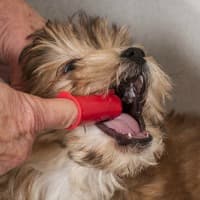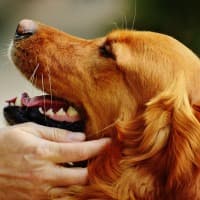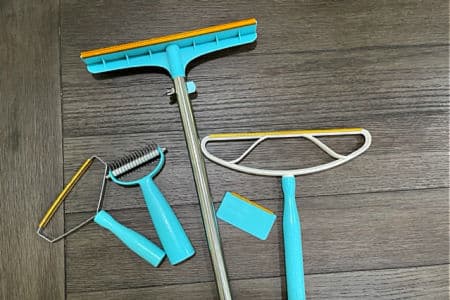FYI: If you buy something through a link on this site I may earn a commission - at NO extra cost to you.
Dog Teeth Cleaning 101
Regular (and correct) dog teeth cleaning can prevent tooth decay and gum disease..... and keep him healthier all over!
Your puppys' pearly white teeth won't stay that way without regular dental care, which includes regular brushing/cleaning at home as well as thorough cleaning and descaling at the veterinary clinic.
This two-pronged approach is the very best way to care for Fidos' teeth, and good dental care will have a positive impact on his general health, even on how many years he lives.
If Fido is still a puppy then you've got a head-start because it's easier to get a baby or adolescent puppy familiar with the tooth-brushing procedure than it is an adult, or senior dog.Plus of course, the younger your pup the better shape his teeth will be in.
Puppy owners can check out this page to learn the ins-and-outs of.... Brushing Puppy Teeth.
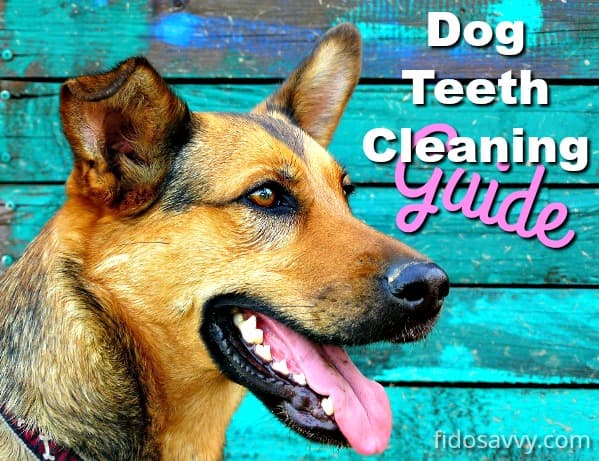
Adult dogs who haven't had their teeth brushed or cleaned regularly may already have tartar build-up or some level of gum inflammation/disease.
For that reason, it's always a good idea to have your veterinarian do a thorough dental check up as a first step.
How To Brush Your Dogs' Teeth
Whenever possible, daily brushing is best for your dogs' teeth because it takes only about 36 hours for plaque to harden and become tartar.
Once tartar builds up, simple brushing won't remove it, so aim for a daily tooth-brushing session. If that's not possible, then brush Fido's teeth every other day, or three times a week. It's going to be a LOT better than not brushing them at all!
- Choose your dog teeth cleaning utensil.... you can choose from bristled tooth-brushes designed especially for dogs, rubber/plastic finger-brushes or dental sponges. Even a clean wash-cloth can work although it's not as abrasive, and therefore not as effective.
- Toothpaste is next. Please ONLY buy toothpaste that is formulated for dogs. It's available in flavors that appeal to Fido, and doesn't contain ingredients which could upset his stomach (foaming agents in human toothpaste can make dogs sick). As your dog can't 'rinse and spit' you can expect him to be swallowing his toothpaste!
- Toothpaste alternatives for dogs. Coconut oil is a good natural alternative to toothpaste for brushing Fido's teeth. It also has antibacterial properties which help to reduce bacteria in your dog's mouth. Dogs usually have not problems accepting this in their mouths. A paste made from baking soda and water is another option, but some dogs don't like the taste, so if your pooch hates it try coconut oil or doggie toothpaste instead.
- Now, wet the brush/sponge/finger-brush and put the toothpaste onto it, and get your dog sitting comfortably in front of you. It can really help to have a second person with you, one to hold your dog while you brush his teeth.
- If you've never brushed your dogs' teeth before, go slowly as he'll probably be anxious, or at the very least curious, about what you're doing. Don't expect him to cooperate right off the bat.
- Gently lift his top lip and brush the outside of his front teeth, then repeat with the bottom ones. Then move around slowly and brush the outer surface of his side teeth, top and bottom. For the first few sessions, this should be enough - he needs time to get used to this strange intrusion into his mouth!
- Use a circular motion as you brush and be gentle but firm with the pressure. Brush/rub the whole surface of the tooth and also focus on the gum-line where debris tends to collect.
- Pay special attention to the upper canines (the 'fangs') and the big double teeth that are closest to the front of his mouth ie. the first double teeth you get to moving from the front of his mouth backwards. These ones tend to collect the most plaque.
- After a week or two you can add gently opening his mouth and brushing the inner (and top) surfaces of his teeth as well (unless your dog is absolutely fine with the procedure, in which case you can add this second step to your routine right away).
- Keep your dog teeth brushing sessions as short as you can, without skimping on the cleaning. It may take up to 5 minutes to begin with, but once you both get used to the routine you can probably do it in 2 or 3 minutes.
- Finally, round off every dog teeth cleaning session with a tasty (and dental-friendly) treat. You want your dog to enjoy having his teeth brushed, and surprisingly many dogs do - once they get used to it.
These few minutes can make a world of difference to your dogs' dental, and general, health... keeps his breath fresher too and that's always good!
Dog Teeth Cleaning - Non-brush Options
Occasionally, brushing a dogs' teeth might not be an option. This can happen if a dog is very unwilling to allow hands near, or in, his mouth for whatever reason. If this is the case then there may already be tartar build up on his teeth.
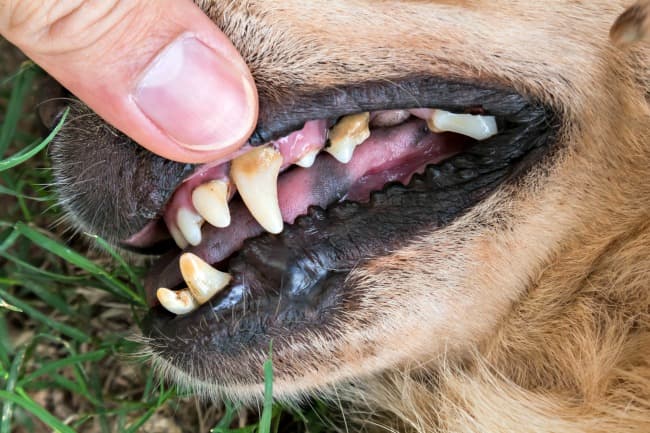
Over time you may be able to reduce it using an enzymatic dental spray. But dogs in this situation are likely to need a professional dental cleaning.
If your veterinarian offers it, the application of Oravet gel is an option.
Oravet is 'painted' onto your dogs' teeth and gum-line to create a barrier that helps prevent tartar or bacteria build-up.
The first application is done by your veterinarian and then you will take home additional product to apply weekly. This can really help dogs who simply won't allow their teeth to be brushed.
There are also dental chews, toys and treats that can help to remove plaque and give teeth and gums a workout.
Rope toys and multi-surface toys are good options. Also feeding dry kibble rather than canned dog food can help keep teeth cleaner due to it's abrasive, crunchy texture.
BUT none of these options are as effective as brushing your dogs' teeth.
If you're not able to brush Fidos' teeth regularly, and thoroughly, then he's definitely going to need annual dental check-ups and regular professional dental cleanings to make sure his mouth stays healthy.
Dogs whose teeth are brushed regularly from puppy-hood, still need annual dental check-ups (can be done quickly when the annual vaccinations are given), but generally don't need yearly professional cleanings. But they will still need the occasional veterinary cleaning because it's not possible to
There are lots of options when it comes to choosing dog dental care tools.
There are toothbrushes and finger brushes, a variety of dog-specific toothpastes, dental wipes and sprays, chews and a whole lot more.
Choose what fits your budget and works best for your puppy/dog/situation. There's literally something for everyone.
Professional Veterinary Dog Teeth Cleaning
Thorough, professional dog teeth cleaning procedure is important for ALL dogs, it's just the intervals between these cleanings that varies depending on how good your at-home dog dental care is.
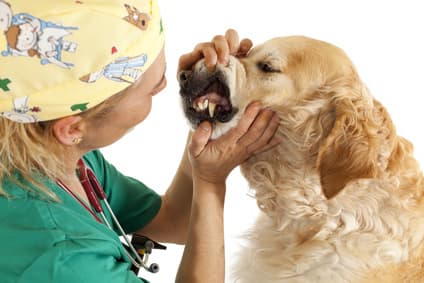
This is because food and particles collect both on the surface of your dogs' teeth, and at the gum-line.
Regular brushing can help keep tartar from building up on the smooth surface of Fidos' teeth.
When you brush/rub where tooth meets gum you are removing much of the 'gunk' that's piling up. But not all of it.
Over time tiny particles of food, other debris and bacteria get trapped at the gum-line, building a ridge of rock-hard tartar.
Left untreated this tartar causes inflammation which eventually creates space between Fidos' teeth and gums, which leads to tooth decay, loose teeth and even abscesses.
A professional dog dental cleaning is done under a general anesthetic which allows your veterinarian to use dental instruments to scrape away the tartar, and to clean out the gum-line 'pockets' properly... keeping Fidos' teeth AND gums nice and healthy.
If during the procedure your veterinarian comes across any cracked, broken or decayed teeth, or gum tissue that needs to be removed, he will be able to treat those as well.
Sometimes you'll be offered a fluoride treatment that will help strengthen the enamel on your dogs' teeth, and there are also
And finally Fidos' teeth will be rinsed and polished so that they look as healthy as they feel.
The cost of a professional dog teeth cleaning procedure varies and depends on several things including:
- What blood-work or pre-op tests are needed
- The condition of his teeth/gums
- The size of your dog
- If additional procedures are necessary (eg extractions, X-rays etc.)
- Whether antibiotics, pain-killers or other medications are needed
- Where you live (costs may be higher in certain cities/areas)
- Whether or not you have pet health insurance that covers dental work
For an average, problem-free dog dental cleaning you could get a bill as low as $100, or it could cost $400, or more.
If your dogs' teeth are in bad shape, he has gum disease, or he needs multiple extractions, the cost could reach $1000 or more.
There are simply too many variables for me to give you an accurate estimate.
However, your veterinarian will be able to tell you roughly how much it will cost to have your dogs' teeth cleaned and polished, so just ask.
But left untreated dental decay and gum disease can cause even worse, more expensive, problems such as heart disease so it's important to make sure that you keep on top of this teeth cleaning business!
I'd suggest getting your pet enrolled in a good pet health insurance plan as early as possible. It can literally be a life-saver if your pet needs surgery, get seriously ill, develops a chronic condition or needs something like extensive dental work. Check out this page to learn all about dog health insurance - it's totally worth it.
you might also like...
- Home
- Dog Dental Care
- Dog Teeth Cleaning
FTC Disclosure: Some pages on this site contain affiliate links. I may earn on qualified purchases.
